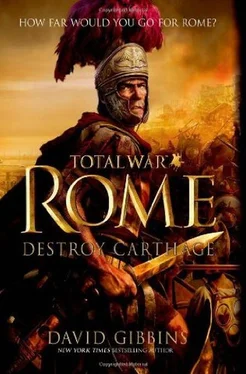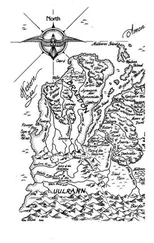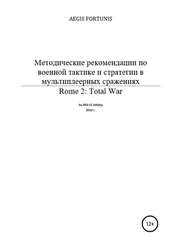David Gibbins - Total War Rome - Destroy Carthage
Здесь есть возможность читать онлайн «David Gibbins - Total War Rome - Destroy Carthage» весь текст электронной книги совершенно бесплатно (целиком полную версию без сокращений). В некоторых случаях можно слушать аудио, скачать через торрент в формате fb2 и присутствует краткое содержание. Год выпуска: 0101, Издательство: Thomas Dunne Books, Жанр: Исторические приключения, на английском языке. Описание произведения, (предисловие) а так же отзывы посетителей доступны на портале библиотеки ЛибКат.
- Название:Total War Rome: Destroy Carthage
- Автор:
- Издательство:Thomas Dunne Books
- Жанр:
- Год:0101
- ISBN:нет данных
- Рейтинг книги:5 / 5. Голосов: 1
-
Избранное:Добавить в избранное
- Отзывы:
-
Ваша оценка:
- 100
- 1
- 2
- 3
- 4
- 5
Total War Rome: Destroy Carthage: краткое содержание, описание и аннотация
Предлагаем к чтению аннотацию, описание, краткое содержание или предисловие (зависит от того, что написал сам автор книги «Total War Rome: Destroy Carthage»). Если вы не нашли необходимую информацию о книге — напишите в комментариях, мы постараемся отыскать её.
Total War Rome: Destroy Carthage — читать онлайн бесплатно полную книгу (весь текст) целиком
Ниже представлен текст книги, разбитый по страницам. Система сохранения места последней прочитанной страницы, позволяет с удобством читать онлайн бесплатно книгу «Total War Rome: Destroy Carthage», без необходимости каждый раз заново искать на чём Вы остановились. Поставьте закладку, и сможете в любой момент перейти на страницу, на которой закончили чтение.
Интервал:
Закладка:
Fabius lunged forward, flicking Porcus’ sword away into the sea, and then came within inches of his face, snarling at him. ‘You never were much of a swordsman, were you, Porcus? You should have fought at Pydna and in Spain and in Africa, instead of toadying up to Metellus. And you won’t see my father when you reach Hades, because he is in Elysium with his comrades.’ He thrust his sword deep into Porcus’ abdomen, twisted it and withdrew it, and then slashed it across his throat, standing back while Porcus staggered forward with his mouth and eyes wide open, his hands pressing against the blood that pulsed from his neck, and then toppled face-first into the sea. Fabius lifted one foot and pushed the body away, watching it slowly sink, and then picked up the dispatch tube that Porcus had been carrying and pulled out the scroll inside, tearing it up and throwing the shreds after the body.
He turned and looked at the liburna, which had broken free of the wreckage and was now hove-to alongside, a rope net hanging over the side to allow the last of the marines to climb back on board. The lembos was a mass of wreckage and bodies, with none of the crew left alive. The naval centurion was standing a few paces away from Fabius, up to his waist in the water, gesturing for him to come. ‘The job is finished, primipilus. The captain wants to return before the wind picks up. And I don’t know about you, but none of my boys wants to miss the assault.’
22
Two hours later, Fabius was back on the wharfside with Scipio and Polybius. He felt drained, but exhilarated. Had Porcus reached Corinth and the message fire been lit on Bou Kornine, it would have been Metellus on Acrocorinth and not Scipio who would have been celebrating the defeat of Carthage. Fabius had focused solely on the task in hand and was barely conscious of his own role, but he knew that by pursuing and destroying the lembos, he had changed history. At the moment all that was important was the added urgency it put on the countdown to the assault; he could see Scipio beginning to look impatient as he watched the preparations at sea. The catapult ships had assembled in a line off the sea wall, with the transport barges containing the legionaries finding their places behind in preparation for heaving forward and landing the first wave of shock troops with grapnels and ladders on the quay, ready to scale the walls. The gamble was that the defenders would be caught off-guard, not expecting a breach of the harbour defences as well as an assault on the sea walls, and that, with Carthaginian attention turned to an attack from the sea, the legionaries assembled at the harbour would be able to pour in to the breach and advance fast towards the upper city and the secondary line of defence around the Byrsa hill to the west.
A young tribune appeared on the platform, took off his helmet and stood to attention. He had startlingly blue eyes, fair hair and angular features — a face that seemed quintessentially Roman, destined to become craggy and hard and one day take its place in the lararium of some patrician house alongside the images of his ancestors. Scipio looked up and nodded at the tribune, who saluted. ‘I bring word from Gulussa, Scipio Aemilianus. The assault force outside the land walls is now ready. The catapults are all aimed at the same length of wall, already weakened by bombardment over the last weeks, and Gulussa thinks a breach will be made immediately. As soon as you give the word, they will let fly.’
Scipio squinted at the line of catapult ships being drawn up close to the sea wall. ‘Then tell him to make it so. By the time you return to him, Ennius will be ready in the ships. The assault will begin in an hour, when you hear my signallers blast the horns.’
‘I will lead the first cohort myself.’
Scipio looked him up and down, and then stared into his eyes, his gaze lingering as if he saw something in the boy. ‘Do you have a good centurion?’
‘The best. Abius Quintus Aberis, primipilus of the first legion. He fought at Pydna, and in Spain.’
‘Good. The centurions are the backbone of the army. Respect them, and they will respect you. But they will expect you to lead from the front. Have you seen action before?’
‘I have spent my whole life preparing for this day. I have studied all of the works of Polybius. I won the sword-fighting competition held for boys in the Circus Maximus, for two years running.’
Scipio glanced at the boy’s belt, where Fabius could see the thin line of shimmer along both sides of the blade where it was visible for an inch or so above the scabbard. ‘You have a double-edged sword.’
The young tribune nodded enthusiastically, pulling the sword out and holding it forward, his grip strong and unwavering. ‘A lot of veterans came back from Spain with Celtiberian swords, and many of us have had the smiths create Roman versions. This one was a present from my uncle.
‘Your uncle?’
‘You will know him,’ the young man said proudly. ‘He served with distinction in Spain. Sextus Julius Caesar.’
Polybius glanced up from the plan, peering over his crystal spectacles. ‘Did I hear someone mention my name a while back?’ He caught sight of the boy. ‘Ah. This is Julia’s son. I don’t think you’ve met him before. Gnaeus Metellus Julius Caesar.’
Fabius suddenly realized what had been familiar about the boy: he had Julia’s hair and eyes. But there was something more, something that made him stare hard at the boy. Scipio clearly saw it too, and after looking at the boy in silence for a few moments he spoke to him again, his voice strangely taut. ‘When were you born?’
‘Four days before the Ides of March, in the year of the consulships of Marcus Claudius Marcellus and Gaius Sulpicius Gallus.’
‘The year after the triumph of my father Aemilius Paullus.’
‘Nine months, to be exact. My mother said that I was conceived on that very night, that it was auspicious. Every year on that day when I was a child we went to the tomb of the Aemilii Paulli on the Appian Way and made offerings.’
Fabius remembered that evening on the day of the triumph almost twenty-two years before, when Scipio had taken up Polybius’ offer of his rooms and taken Julia there for an hour, just the two of them, and then later in the theatre when Metellus had come to take her away. But he also knew from Julia’s slave girl Dianne that she had resisted Metellus’ advances that night, and had gone straight to the Vestals to be with her mother until the marriage a month later. She would have known who the father was, and Metellus too must eventually have guessed. Gnaeus Metellus Julius Caesar was Scipio’s son.
Scipio suddenly looked sternly at the boy. ‘It is unheard of to make offerings at the tomb of another gens. You must be wary of offending the social order. Does your father know?’
‘We went without his knowledge. But my mother wanted me to tell you that we did it, when I had the chance to speak to you. My father was absent for most of my childhood, on campaign or holding administrative posts in the provinces. My mother never accompanied him. Even in Rome he lives in a separate house. I have lived with the failure of their marriage all my life.’
Polybius turned to Scipio. ‘I know that you had no interest in gossip among the gentes during your recent time in Rome, but it’s become an open secret that Metellus is more at home among the prostibulae than he is with his own wife. He has changed little in his habits since you were at the academy. It is said that they have not shared a bed for years.’
‘Not since my sister Metella was born,’ the young man said, looking at Scipio. ‘He tried to beat my mother, and I have no love for him. I was brought up in the household of my uncle Sextus Julius Caesar, and am betrothed to his daughter Octavia. My mother says that her legacy and mine will be in the bloodline of the Julii Caesares not the Metelli.’
Читать дальшеИнтервал:
Закладка:
Похожие книги на «Total War Rome: Destroy Carthage»
Представляем Вашему вниманию похожие книги на «Total War Rome: Destroy Carthage» списком для выбора. Мы отобрали схожую по названию и смыслу литературу в надежде предоставить читателям больше вариантов отыскать новые, интересные, ещё непрочитанные произведения.
Обсуждение, отзывы о книге «Total War Rome: Destroy Carthage» и просто собственные мнения читателей. Оставьте ваши комментарии, напишите, что Вы думаете о произведении, его смысле или главных героях. Укажите что конкретно понравилось, а что нет, и почему Вы так считаете.












